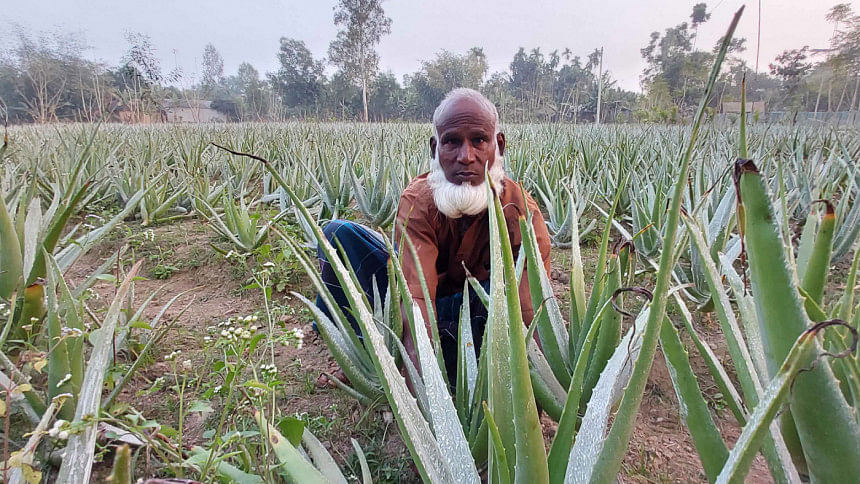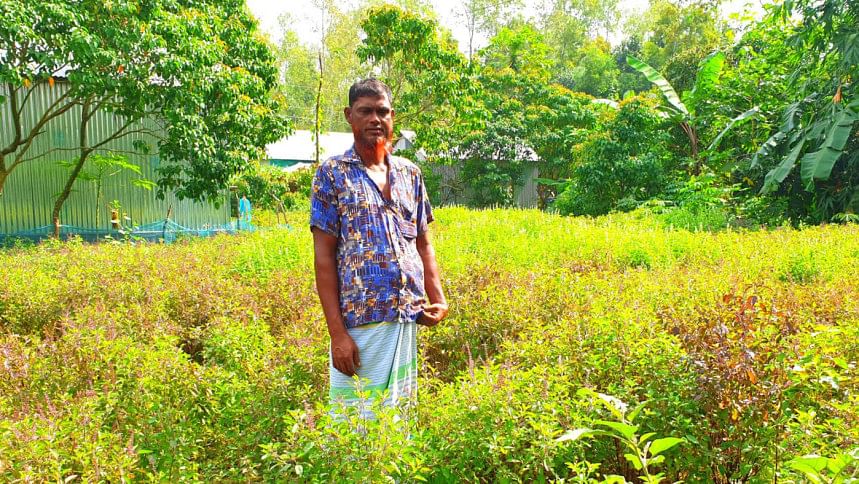Growing medicinal plants sees bright prospects

Farmers of different hilly areas in Tangail's Madhupur and Ghatail upazilas are cultivating various types of medicinal plants like tulsi (basil) and aloe vera commercially and earning good profits.
Seeing the success of some, other farmers are also getting interested in this field. Meanwhile, the local agriculture department sees a bright prospect for commercial cultivation of medicinal plants on a large scale.
The soil of the hilly areas is favourable for such cultivation, and such plants have a great demand, both at home and abroad, they said.
Farming of medicinal plants is easy and it costs much lower than growing other crops, growers said.
But some syndicates of buyers are depriving the farmers of fair prices due to lack of marketing facilities and proper monitoring, they alleged.
TULSI
Commercial cultivation of tulsi has been gaining popularity among local farmers in different remote areas of the district, due to low cultivation cost and good market prices.
The tulsi plant is known for its many health benefits since ancient times. There was a time when one or two plants could be seen in the backyard of many families. Now, it is being cultivated on a large scale.
Farmer Mohammad Abdullah of Fatiyamari village in Ghatail said he cultivated tulsi on two acres of land, spending Tk 35,000, as it is more profitable than rice cultivation.
Dried-up tulsi leaves are sold at a designated collection point, and each maund of leaves is sold at Tk 1,600, he said.
Abdullah also earns some extra money by selling tulsi seeds at Tk 2,000 per kilo.
Local agriculture officials said tulsi plantation requires no chemical fertilisers and pesticides. The entire farming is done with organic fertilisers, and hardly any weed grows.
Ghatail Upazila Agriculture Officer Dilshad Jahan said tulsi is called the "queen" of all herbal plants.
Inspired by Abdullah's success, many farmers in the upazila are now leaning towards tulsi cultivation, she said.

KALMEGH
Commercial production of Kalmegh (green chiretta) and its wide use as an "alternative to quinine" is increasing nowadays.
Many farmers in Madhupur and Ghatail upazilas are getting benefits from cultivating the medicinal plant.
Kalmegh, which tastes bitter, has been a common medicine in Bangladesh since ancient times. Due to favourable weather conditions, Kalmegh grows everywhere in the country.
Kalmegh is being cultivated commercially at Jangalia, Maguntinagar, Sholakuri, Beribaid, Phulbagchala, Mahishmara and Aushnara village in Madhupur.
Farmers Hyder Ali, Mujibur Rahman, Dulal Miah, Rustam Ali and Muslem Uddin said Kalmegh cultivation does not require any special care.
Mature seeds fall from the trees on the ground and automatically grow.
The plant can be grown as a secondary crop as it grows more in shaded areas, they said. At least 12 to 15 maunds of Kalmegh can be produced on each bigha land.
In the peak season, each maund of Kalmegh is being sold at Tk 18,000 to 20,000.
Wholesalers from Dhaka's Karwan Bazar come to the areas to buy Kalmegh, which is also exported to India, they said.
If the agriculture department comes forward by providing agricultural loans and forest department by leasing out land, many will take up Kalmegh cultivation, they added.
Madhupur Upazila Agriculture Officer Al Mamun said Kalmegh farming is a good initiative and they are ready to provide all kinds of cooperation.
ALOE VERA
Farmers are cultivating aloe vera, a plant with herbal qualities, after being inspired by the agriculture department.
Aloe vera leaves are used in producing different types of cosmetics and medicines.
Many like to consume it with the hope to get relief from different diseases like costiveness, skin diseases and urinary problems, herbal doctors said.
Local agriculture officials said aloe vera farming needs proper care, and farmers can earn a good profit from it as it can be harvested a couple of times a month.
Aloe vera leaves are thick and fleshy, and one can harvest 30 to 35 maunds of the leaves from 20,000 plants.
Each maund of aloe vera is sold at Tk 700 to 800, farmers said, adding that they can yield aloe vera after 18 months of plantation.
Moreover, six to seven additional saplings grow from each plant.
Farmer Monnas Ali from Mahuntinagar in Madhupur said earlier, he used to cultivate pineapple or banana on his three bighas land.
But, after getting advice from the local agriculture officials he started aloe vera cultivation on the same land a couple of years ago.
Tangail DAE Additional Deputy Director Mahmudul Hasan said although aloe vera has a huge demand, local growers do not get fair prices for lack of proper marketing facilities.

 For all latest news, follow The Daily Star's Google News channel.
For all latest news, follow The Daily Star's Google News channel. 



Comments